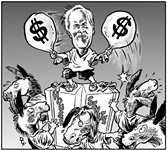Texas Family Values
Why don't we protect our children? Because we'd rather not spend the money.
By Michael King, Fri., Oct. 22, 2004
The preliminary results of that report from the Health and Human Services Commission were made available late last month, and there are few surprises. The HHSC's inspector general found that "caseworkers are inundated with increasing caseloads," resulting in a collapse of standards and "children being left in abusive situations or repeated incidents of abuse and neglect." After a review of a representative sample of 2,221 CPS investigation case files, the commission reported that "in more than half of the investigations where specific case action was needed, caseworkers either failed to maintain contact with the child, failed to 'staff the case' with their supervisor for appropriate support and direction, or failed to provide all needed services to children."
When one considers that every one of those 2,221 cases reviewed wears a child's face, the details are even more disheartening. Of 583 cases where services were needed, in 299 (51%) they were not provided. Of 171 cases referred elsewhere for further action, in 103 (60%) there was no follow-up. Likewise for 56 (45%) of the 124 cases where children were placed in foster care. And in 152 cases "at least one child was left in a life-threatening situation." Recall that these 2,221 cases represent simply a small statistical sampling of the larger 2003 CPS universe – 185,732 referrals involving 278,871 children, generating 78,475 confirmed cases of abuse or neglect – and the scale of slow-motion, invisible disaster reaches truly Dickensian proportions.
Absolutely Free
It is, of course, all too easy to demagogue on this subject, and last week Comptroller Carole Keeton Strayhorn returned to the stage, doing her best impersonation of The Simpsons' Helen Lovejoy. "This is about the children!" she declared, unveiling legislation intended to implement her staff's 87 recommendations in the "Forgotten Children" report they issued in April on the state of the foster care system. Many of those reforms, mostly managerial streamlining, appear sensible enough, although the comptroller's faith in privatization remains boundless, even though by her own account private contractors already provide 73% of Texas' foster care – if that were the solution, we'd be three-quarters of the way there.
It's no secret that Strayhorn would like Rick Perry's job, although she deflected all such speculation by reiterating, "This is about the children, our most precious, most vulnerable resource." Then she went on to say, by way of requesting an immediate executive order for a "crisis management team," "There is only one person that has the power to make [reform] start happening today, and that person is the governor." Perry's office responded by noting (changing the subject a bit) that he is already moving on CPS. "Reforming Child Protective Services is a top priority of Governor Perry," said spokesman Robert Black. "That's why he has ordered a statewide investigation of CPS practices, supports new resources for the agency and the hiring of additional caseworkers, and has worked with legislators of both parties and the Health and Human Services Commission to institute immediate reforms."
I'm all for infighting among the leadership, especially if it benefits Texas kids, and in this exchange (despite the confounding of agencies) the governor momentarily has the high ground. Perry at least has reluctantly acknowledged that any significant improvement at CPS will require additional resources; despite all the blood and thunder and color posters of orphan laundry at her press conference, Strayhorn insisted over and over again to a skeptical press corps that her bill has a "zero fiscal note" and that fixing the state's foster care system – even hiring 150 additional enforcement officers – is "not going to cost anything."
With all due respect, Madame Comptroller, I just don't believe it. And for our political leadership to persist in selling this snake oil – that running a state the size of Texas can be done on the cheap – to an all-too-credulous electorate is a grand and mutual failure of responsibility.
Past Due
There are more than 6 million children in Texas, roughly one in 12 of all American children. According to 2002 figures (it's gotten worse since), 1.3 million of them live in poverty (most in working families), the primary breeding ground of familial neglect and abuse. According to the Center for Public Policy Priorities, Texas ranks 48th in what we spend on child protection (per child), or 60% less than the national average. We'd have to spend $1 billion more annually (i.e., a reasonable bump in the cigarette tax) just to reach the national average, and $500 million just to reach the average spent in the other Southern states. We've placed about 16,000 children in foster care (that is, sheltered from often-murderous abuse and neglect); a proportionate average against other states would predict more than three times that number. Of course, we can flatter ourselves, if we like, that Texas biological parents take three times better care of their children than do parents in other states.
Familiar with these numbers from years of work as an advocate and as a judge, CPPP director Scott McCown pointed out conservatively last week that to address the crisis at CPS, the number of caseworkers would have to be tripled from the current 800 to 2,700, allowing the monthly caseload to drop from its currently preposterous level of 62 per month. (Note to Albert Hawkins' hiring committee: What person in her right mind would take such a job?) Guess what – that costs money, which can be obtained only by creating a reasonable, progressive, and productive state tax system. "I think kids are dying," McCown told The Dallas Morning News, "because of the unwillingness to recognize that we have to pay some additional taxes in Texas."
The official response of the governor's office was predictable but even more condescending than usual. "Scott McCown has never seen a dime of taxpayers' money that he didn't want to spend," snarled Perry spokeswoman Kathy Walt. "He wants to run up gigantic tax bills and spend every penny." In this instance, Walt's tongue is sharper even than that of her boss – if not "every penny," might she and Perry agree that the great state of Texas could strive for the national average? Every recommendation of the CPS report – lower caseloads, increased training, reducing turnover, monitoring compliance, reforming foster care – costs real money. Are Texas children worth as much as Toyota, Cabela's, or the imperial, multibillion dollar Trans-Texas Corridor?
Texas politicians, of every stripe, never tire of talking of "family values." Until they begin to take seriously their responsibilities to protect and care for Texas children, they should not be suffered to utter the words. ![]()
Got something to say on the subject? Send a letter to the editor.










